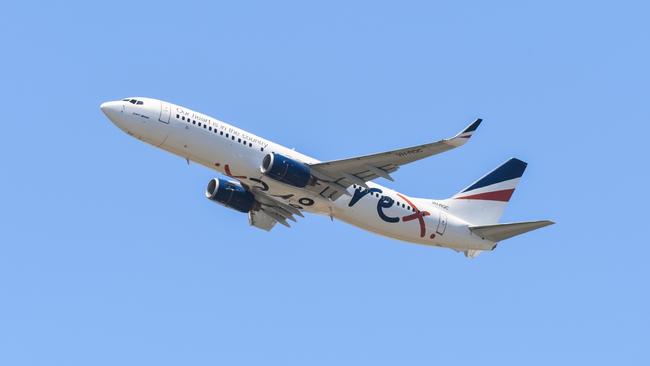Virgin Australia’s victory over Rex’s attempt to claim ownership of Economy X branding
The airline has failed in a cheeky attempt to trademark the brand Economy X for itself, after learning Virgin Australia had not done so.
Business
Don't miss out on the headlines from Business. Followed categories will be added to My News.
Rex has failed in a cheeky attempt to trademark for itself the term “Economy X” first used by Virgin Australia to describe extra legroom seats.
The dispute blew up when Rex started leasing former Virgin Australia Boeing 737 jets without making any changes to the interior cabins.
It’s understood Virgin Australia asked Rex to remove the Economy X branding on relevant seats, but Rex refused on the basis its rival had not formally trademarked the term.
To make matters worse, Rex then applied to the Registrar of Trade Marks to claim ownership of Economy X for itself, which would have had ramifications for Virgin Australia’s own use of the branding.
Virgin Australia opposed Rex’s application, arguing it created the brand in 2016 and launched it in marketing and sales from February 2017.
Rex’s case disputed Virgin Australia’s claim of ownership over Economy X, saying it was a “description of class of service, or seat class”.
“Evidence is provided in support of this view, including a website dated 2016, showing that Qantas uses the letter ‘X’ as the class code for flight rewards/award bookings in economy class,” said the ruling by Registrar of Trade Marks’ delegate Nicholas Butson.
Rex also asserted that even if the brand was a trademark owned by Virgin Australia, it was an unregistered trademark and the intellectual property rights were vague, due to the airline’s change of ownership in 2020.

Mr Butson’s ruling said a trademark did not necessarily have to be registered for ownership to be established.
He said ownership could instead be established through “authorship and use of a trademark”.
“This ground does not require (Virgin Australia) to establish that it is the owner, merely that there is an earlier claim to ownership based on use by someone other than the (Rex),” wrote Mr Butson.
He found Virgin Australia had provided sufficient evidence of its authorship of Economy X and use of the trademark before Rex.
Costs were awarded against Rex in the matter.
A Virgin Australia spokesman said they were “pleased with the decision which found the airline had clearly established use of the Economy X mark over the past six years”.
“Virgin Australia’s Economy X product was an Australian-first when it was launched in 2017, providing our economy guests with extra legroom and an enhanced travel experience,” he said.
Virgin Australia’s application for the term to be trademarked, had since been accepted by the Australian Trade Mark Office.
A Rex spokesman declined to comment on the ruling other than to point out the airline had adopted the term “Rextra” seating for the rows previously designated Economy X.
Rex made the decision to expand its network to major city routes when there was some doubt whether Virgin Australia would recover from financial collapse in April 2020.
As a result of the administration, Virgin Australia underwent a major fleet reduction, which led to Rex being able to lease a number of Boeing 737-800s at bargain-basement rates.
Rex currently operates a fleet of seven 737s, with plans to add two more in coming months.
At the same time, Virgin Australia has grown its fleet of 737s from 58 aircraft post-administration to 84 with plans to add eight Boeing 737 Max 8s this year.
More Coverage
Originally published as Virgin Australia’s victory over Rex’s attempt to claim ownership of Economy X branding





